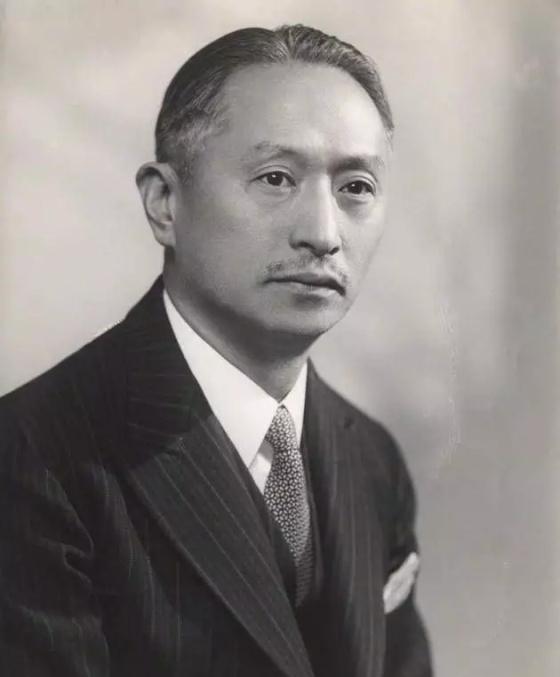On January 28, 1919, the United States, Britain, France, Japan, and China discussed the Shandong issue in Paris. The defeated Germany would withdraw from Shandong, but the Japanese representative Makino demanded unconditional succession of German interests in Shandong. Gu Weijun, the representative of China, listened, stood up to face the representatives of the other four countries and asked: "The West has produced a saint, his name is Jesus, and Christianity believes that Jesus was crucified in Jerusalem, making Jerusalem a world-famous ancient city." And in the East there was also a saint, his name was Confucius, and even the Japanese regarded him as a saint of the East. Mr. Makino, are you right? ”
Makino had to admit, "Yes." ”

Gu Weijun
Gu Weijun smiled: "Since Mr. Makino also recognizes Confucius as a saint in the East, then Confucius in the East is like Jesus in the West, and Shandong, the birthplace of Confucius, is just like Jerusalem is the holy land of the East." Therefore, China cannot give up Shandong just as the West cannot lose Jerusalem! ”
Gu Weijun's left hand was raised, his palm was spread, his fingers were loose, and a pocket watch was hanging down with a chain, "Please allow me to show you something again." Before entering the venue, Mr. Makino of Japan gave me this gold watch in order to please me and compete for the privileges of Shandong. ”
This watch was actually picked up by Gu Weijun, here he just borrowed the topic to play, the venue began to turn heads and ears, Gu Weijun was polite, paused slightly, and then said: "Mr. Makino is angry, he is really angry." Let's just say I stole his gold watch. So, I would like to ask Mr. Makino, if you Japan, before the whole world, want to steal our entire Shandong Province, should the thirty-six million people of Shandong Province be angry? Forty million Chinese should I be angry? I would like to ask, is this act of Japan a theft? ”
Gu Weijun's tone was sharp to the peak, and at the same time, he raised his right hand to fork his five fingers and slammed it into the void in front of him, and then slammed his head on one side, and the righteous awe on his face and the anger that had been hidden for a long time turned into a sharp sword light, and shot at the Japanese representative like lightning.
Next, the audience was full of applause and thunderous applause. U.S. President Wilson, British Prime Minister Lloyd Georges, and French Prime Minister Clemenceau — The big three of the Paris Peace Conference — listened to Gu Weijun's loud statement and stepped forward to hold his hand.
In 1918, World War I ended with a crushing defeat for the Allies, of which China was one of the victorious powers. In this era of "axiomat victory over power," the upcoming Paris Peace Conference will give China justice and abolish all unequal treaties imposed on China by the Western powers for more than half a century.
However, the Paris Peace Conference quickly shattered the dreams of the Chinese people. Ignoring China's opposition and the "axioms" they had advocated, several major powers sold their rights and interests in Shandong to Japan. The patriotic movement in China was in full swing, and in Paris, on June 28, 1919, Gu Weijun, a representative of the Chinese delegation, fought for The rights and interests of China.
At the signing ceremony, one by one, the seals were printed expressionlessly, but Gu Weijun stood up angrily and heavily, he walked in the center of the venue, we can hardly describe his mood, he said: "I am very heavy, I am very angry, I refuse to sign." ”
Then there was an uproar. The rebellion of this Chinese is also the resistance of the entire Chinese people. At this time, the stirring patriotic enthusiasm made him want to shout only one word to the great powers--no!
The China in which Gu Weijun lived was judged to be a "weak country." Since the end of the Qing Dynasty, whether others have come to the door (such as the Opium War) or declared war on others (such as the Eight-Power Alliance), China has only one "defeat" word to speak of. The dictator had to pay reparations for the loss of land to ensure the continuation of his rule. This refusal of visas is of landmark significance in the history of China's diplomacy, breaking the diplomatic situation of "starting from beginning to giving in" for the first time - refusing to sign. China will gradually regain its lost sovereignty in the days to come.
On May 20, 1919, the Beijing government sent a telegram to the Chinese delegation to the Paris Peace Conference: "This draft treaty should generally be signed, but the Shandong question should be declared separately reserved for salvage." When the request to retain the signature was rejected, the Beijing government issued a directive on the 24th: "If it is difficult to retain, you can only sign." However, Gu Weijun, with the support of Lu Zhengxiang, who was hospitalized due to illness, did not listen to the instructions of the Beijing government and refused to sign the peace treaty with Germany, which is of epoch-making significance in China's modern history. (Source| Reader's Daily Source: "100 Moments That Determined Human History" Zhou Yun / Author)